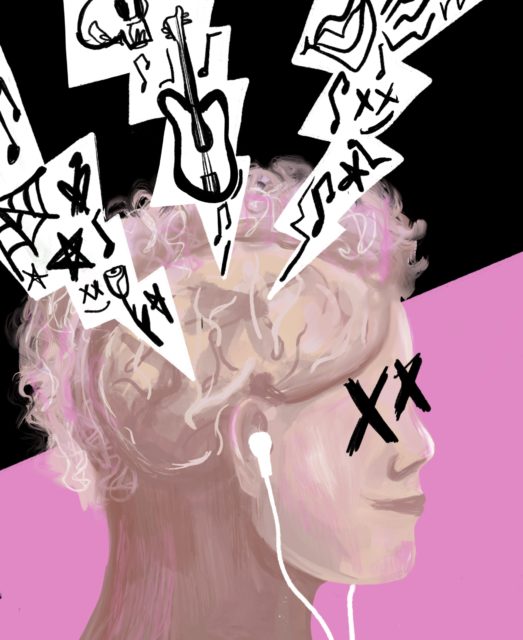Being stuck in the past isn’t necessarily the worst place to be.
And in the world of music, borrowing from it should be encouraged.
Last month, hip-hop artist Machine Gun Kelly released his fifth studio album “Tickets to My Downfall,” a remarkable departure from his comfort zone in favor of a rock sound he had flirted with in previous works. Trap beats were tucked away as he picked up his highlighter pink Schecter guitar to put out a 36-minute pop-punk record that evokes the late ‘90s electricity the genre once radiated. With production help and collaboration from revered drummer Travis Barker, the record’s quick comparisons to blink-182’s music should come as no surprise to anyone.
While critics gave the record generally favorable reviews, the discourse surrounding its relative lack of originality is more compelling. Pitchfork called MGK’s genre hop “the ultimate form of fan service,” AllMusic noted some songs being “too close to blink-182 worship” and esteemed music critic Anthony Fantano did not enjoy the record at all, citing its drab and generic take on pop-punk. Attempts at scoring nostalgia points don’t seem to go over well for reviewers and critics.
The same can be said for rapper Saweetie, whose biggest hits feature prominent samples of past hip-hop tracks. Her latest single “Tap In” was met with scrutiny from fans for sampling Bay Area icon Too $hort’s “Blow the Whistle,” which she recently defended by saying hip-hop’s foundation relies upon sampling other records.
Clearly, critics and fans alike believe that artists who lean into nostalgia are trapped in the past – or even worse, they can’t escape it.
[Related: Second Take: Recent wave of nostalgia-based marketing is compelling, but may be unsustainable]
But nostalgia isn’t necessarily a net negative for music or its fans. Conjuring the sounds of days gone by can give familiar listeners happy reminders of the original works artists are pulling from. Younger generations of listeners are welcomed to sample the sounds that were beloved before their time, which gives them a chance to broaden their musical horizons beyond today’s top hits. Ultimately, artists are paying homage to the influences that shaped their individual creativity and vision – sharing pieces of musical history while leaving their own mark.
The benefits of nostalgic tunes even extend to a molecular level. Neuroimaging studies have shown that music gives listeners hits of dopamine as they stimulate multiple parts of the brain like the visual cortex, and repeated listens can eventually evoke different stored memories attached to the music. A 2008 study from the University of Leeds found that memories formed during the teenage and early adulthood years are the ones people return to the most, something they coined as the “reminiscence bump.”
Given how closely music and memory are intertwined, newer records that come around carrying the aura of nostalgia offer listeners the best of both worlds by allowing them to create new memories while reflecting on the past records they are fondly reminded of. Songs like MGK’s “forget me too,” an angsty breakup song with pop singer Halsey, whose vocal performance channels an early-2000s Hayley Williams of Paramore, possesses a head-bopping, rapid energy that injects a jolting gleam of brightness into the fading legacy of the pop-punk genre.
[Related: Second Take: Despite originality concerns, Disney’s CGI remakes excite long-time fans]
Granted, music critics have valid concerns about the sanctity of originality when it comes to contemporary music. But relying on past influences doesn’t mean creativity in songwriting is thrown out the window. Hip-hop sampling has been a production technique for as long as the genre’s been around, and it takes much more effort to put an innovative spin on a past record than simply duplicating the beat for the artist to record over.
Look no further than producer Metro Boomin and rapper 21 Savage’s “Many Men” – which samples and shares a name with rapper 50 Cent’s 2003 original – off their most recent collaboration “SAVAGE MODE II.” Despite retaining similar tempos, lyrical ideas and flows, Metro Boomin’s ominous and supernaturalistic production build a contrasting atmosphere that’s a crisp take on the classic – and something for newer generations of listeners to call their own.
In the Internet era when cultural moments are easier to ignite than ever, recent viral trends prove that the sounds of yesterday have a place in the contemporary. A September TikTok video of a man skating along a highway to Fleetwood Mac’s 1977 classic “Dreams” garnered 64 million views on the platform. Corresponding streams of the song landed it at #12 on the Billboard Hot 100 chart while the band’s record “Rumours” placed #7 on the Billboard 200 albums chart, more than 40 years after its initial release. Even younger generations who populate apps like TikTok share an interest in sounds of the past, and this communal effect of passing music down means artists shouldn’t be afraid to continue wearing inspirations on their sleeve.
People will gravitate toward the aspects in life that remind them of fond memories, and nostalgia-inducing music has proven to be one of them.
So critics, rest easy – the artistry of songwriting won’t be threatened by a few innocuous trips to the past.

